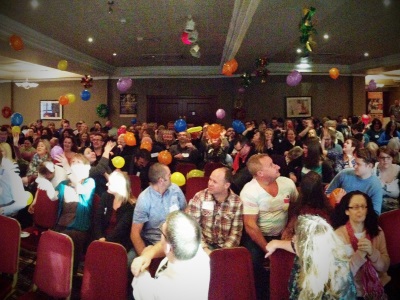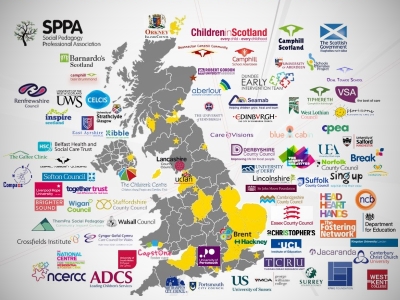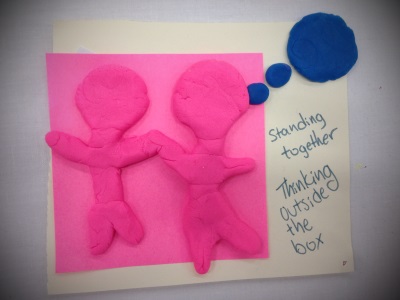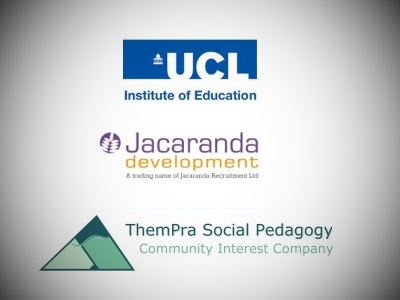The SPDN at the University of Central Lancashire on 03/04 December, 2015
For the 13th SPDN event, participants gathered at the Preston campus of the University of Central Lancashire. Earlier in the week, UCLan had successfully validated a brand new BA (Hons) degree in Social Pedagogy, Advocacy and Participation, so we were particularly pleased to explore ways of developing social pedagogy at scale.
Evening Seminar:
To visualise key developments, Gabriel had put together a UK map (see slide 9) providing an overview on what is going on in the UK regarding social pedagogy, which practice organisations and FE/HE institutions have been actively involved in social pedagogy. One of the intentions was to grow our collective understanding of what is happening where, and we aim to update the map on an ongoing basis here.
One of the greatest opportunities at SPDN events is the many spaces created for dialogue and learning from others. Following UCLan’s social pedagogy journey, Els D’Hooge had organised 11 story circles with organisations eager to share their own social pedagogy journeys. Over 3 rounds of 20 minutes, participants could find more out about social pedagogy and its impact on practice from the following narrators: Sylwia Cisowska and Carlos Rodrigues, social pedagogues from Lincolnshire County Council; John Palczynski, Head, Heart, Hands foster carer with Surrey County Council; Rute Goncalves, social pedagogue with Surrey County Council; Simon Taylor, Lizzy Watts and Christer Goetzinger from Derbyshire County Council; Nicola Boyce from St Christopher’s Fellowship; Matthew McFadzean from Care Visions; Bonnie Atkinson and Margret Snellgrove from Ochill Tower School; Chris Walter and Vibeke Alfred from the Camphill School Aberdeen; Kirsten Hogg from Camphill Scotland; Gary Shepherd from Wigan Council; and Stefanie Dorotka from Hackney’s Virtual School for Looked after Children. Based on the feedback we received, both participants and narrators found this a really valuable and insightful set-up to connect, learn and offer inspiration to each other – all of which are key ingredients to scaling up social pedagogy.
The UCLan team had also organised 2 amazing acts for a thought-provoking and entertaining finale to the evening seminar. Eight writers from Reading the World, an arts and asset based community education programme that utilizes creative writing and performance to give people with lived experience of marginalization, stigma and/or social isolation the tools to make their powerful voices even more powerful, performed work that was deeply affecting and which offered profound insights into the writers’ experiences and perceptions.
The evening programme concluded in a noisy fashion with UCLan’s Worldwise Samba Drummers playing some catchy rhythms and then inviting everybody to get involved by taking an instrument and learning together. Through easy to follow instructions and support, every new drummer learnt a basic samba rhythm and then joined together for the grand finale. Looking back, it was a fantastic evening event, in a great venue, with lots of engaging and thought-provoking elements, which made us look even more forward to the following day.
Day seminar:
The ensuing plenary discussion, facilitated by Abby, showed the different ways and perspective from different presenters and their organisational journeys and approaches to scaling up social pedagogy. This interactive panel discussion included Melissa Green (The Fostering Network), Danny Henderson (Care Visions), Pat Petrie (CUSP), Nicola Boyce (St Christopher’s Fellowship), Simon Taylor (Derbyshire County Council), Helen Jones (independent consultant with KPMG Foundation) and Gary Shepherd (Wigan Council). Thanks to UCLan’s tech team, you can watch the entire morning session here:
After lunch, Cath Larkins from UCLan led an excellent creative group activity across the three levels of Greenbank foyer. Picking up on the river metaphor, she invited participants to group themselves based on how far along their social pedagogy journey they were, then to explore the challenges ahead and imagine what resources they might need to master these challenges. Participants then built little rafts designed to get them farther on their journeys, forming alliances and thinking specifically about what they would need to have on board of their rafts. In an exciting atmosphere, each group then launched its raft from the first floor balcony in the foyer to test how well their ideas might fly – all landed safely in the lobby’s ‘river’.
Then it was off to tackle the most logistically challenging aspect of this SPDN: getting all 185 participants to their chosen workshops in 3 different parts on campus! Thanks to the amazing guidance from UCLan’s student ambassadors, participants made their way across campus to join two of the following workshops:
- Adopting a Social Pedagogy Approach in Schools (Sandy Posnikoff, Actus Consultancy & Training);
- Between two Directions – Social Pedagogy in Denmark (Martin Sørensen, UCC Copenhagen);
- The ’Rich Child’: Dream or Reality? (Cécile Remy, UCL Institute of Education);
- So, How Does This Relate To What I Do?? – Social Pedagogy and Its Fit With Social Work Standards (Jane Lloyd and Lowis Charfe, UCLan);
- Scaling up Social Pedagogy: Characteristics of a social pedagogic mission statement (Pat Petrie, CUSP & Thure Johansen, Jacaranda);
- Addressing systemic barriers (Freya Burley, Grace Howard, Caz Bowles, The Fostering Network);
- An Introduction to Social Pedagogy – The Social Pedagogy and Egg Experience (Susan Bramwell & Cath Larkins);
- From pilot light to cooking with gas? (Kirsten Hogg, Camphill Scotland and Sandra Sabiston & Angela Flaws, Camphill Blair Drummond);
- Open doors, gates and barriers – recreation not replication – Derbyshire’s journey with Social Pedagogy (Lizzie Watts & Simon Taylor);
- Turning Challenges into Opportunities (Andy Carter & Gabriel Eichsteller, ThemPra and Abby Ladbrooke, Jacaranda)
Instead of bringing participants back together in the plenum as we usually do, we designed the final reflection and ending of this exciting event to take place in each workshop group. We asked each person to think about which message they were taking aware and wanting to share with the wider world, then write this on a post-it note and post it as a message in a bottle. As always, people came up with brilliant messages reflecting their devotion and sincerity, which, to us, is the key reason why the SPDN is such a vibrant and inspirational movement. Here are some selected messages:
- The water will continue to flow and gather until there is a tipping point and the UK’s social pedagogy will be part of the mainstream.
- keep being social pedagogic, it will be noticed, and will raise curiosity and will be better understood. It will then occur more and more spontaneously.
- The more I know the more I love social pedagogy. Inspiring and energising. It rocks!
- Keep talking, keep listening to ensure learning.
- It has been an exciting privilege to hear the stories of how social pedagogy is growing and developing in the UK.
- I’m so pleased to see people thinking about how we spread social pedagogy practice.
- Pedagogy connects, it’s real, it works, it’s the name for what we do!
- I have the skills to define and explain my practice.
- Transformative, engaging, enthusing, inspiring and authentically simple! Thank you.
- Social pedagogy is like a spark in the darkness that surrounds us!
- Inspirational and encourages you to learn.
- Social pedagogy, hope in challenging situations or in everyday life.
- Very inspired to make changes today!!!
- As we all embrace this, we will see the results and never turn back!
- I feel hope again. SPDN are doing something very right.
- Transformation appears when people are touched.
Having fun exploring scaling with balloons. When people are ready to respond, it’s infectious. #SPDN pic.twitter.com/GE9WilA3tL
— Marc at work (@esiotrotting) December 4, 2015
#SPDN #HeadHeartsHands a very enlightening few days that will have a long term impact 🙇💜✋
— Debs Dawkins (@debsydoescakes) December 4, 2015
Amazing couple of days at @SocialPedagogy #SPDN. @JonnyMallinson‘s myth busting will stay with me, but learnt so much from everyone!
— Kirsten Hogg (@KirstenHogg) December 4, 2015
No words would do last 2 days justice! Epic SPDN #SPDN
— Naeomi Randles (@MooMoo_1985) December 4, 2015
@UCLanSocialWork #SPDN #HeadHeartHands. How do we create situations where it’s impossible not to learn? Need to co-construct meaning.
— Jane Lloyd (@JlloydJane) December 4, 2015
BIG THANKS to @UCLanSocialWork @JlloydJane @AidanWorsley @JoCugs @aligardnerUCLAN @o_lark and Lowis for hosting the #SPDN! So inspiring!!!
— ThemPra (@SocialPedagogy) December 4, 2015






